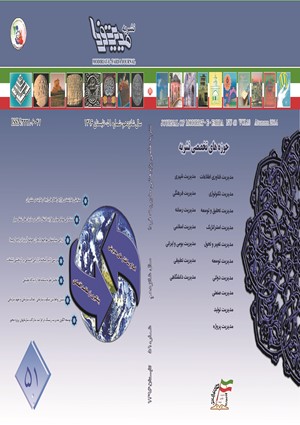عناصر سازمانی مؤثر و نتایج همکاری رقابتی میان ویژهکاریها در صنایع کوچک و متوسط
محورهای موضوعی :حسین رحمان سرشت 1 , بهرام جبارزاده کرباسی 2
1 - دانشگاه علامه طباطبایی
2 - دانشگاه علامه طباطبایی
کلید واژه: شیوه رهبری ساختار سازمانی همکاری رقابتی میان ویژهکاری سازوکارهای ترکیب دانش.,
چکیده مقاله :
با توجه به شرایط متغیر و ناپایدار محیطی، شرکتها برای ادامه حیات خود و داشتن موقعیت رقابتی مناسب همواره نیازمند بهرهگیری مناسب از دانش موجود در سازمان هستند. استفاده از این منبع بدون داشتن ساختار و رهبری مناسب امکانپذیر نیست. وجود ساختار و رهبری مناسب میتواند ضمن ایجاد رقابت برای خلق دانش جدید، با فراهم کردن فضای مناسب همکاری، شرایط تسهیم دانش خلق شده را نیز ایجاد کند. بر این اساس در این مطالعه به بررسی عناصر سازمانی مؤثر و همچنین نتایج همکاری رقابتی میان ویژهکاریها در صنایع کوچک و متوسط پرداخته شد. نوع تحقيق علّی است و نمونهی آماري اين پژوهش، 165 نفر از کارکنان و مديران شاغل در شرکتهای مستقر در نواحی صنعتی شهر کرمان و ابزار گردآوري دادهها پرسشنامه است. پایایی پرسشنامه برای متغیرهای رهبری ملاحظهکارانه، رهبری مشارکتی، رسمیت، تمرکز، همکاری رقابتی میان ویژهکاری و سازوکارهای ترکیب دانش به ترتیب، 81/0، 70/0، 72/0، 70/0، 91/0 و 84/0 به دست آمد. نتایج پژوهش حاکی از آن است که رهبری ملاحظهکارانه و رسمیت بر همکاری رقابتی میان ویژهکاری اثرگذارند. اما رهبری مشارکتی و تمرکز اثری بر همکاری رقابتی میان ویژهکاری ندارند. همچنین نتایج نشان دادند که همکاری رقابتی میان ویژهکاری اثری مثبت و معنادار بر سازوکارهای ترکیب دانش دارند.
Due to changing conditions and unstable environment, Companies to survive and have a good competitive position always require proper utilization of the knowledge available in the organization. Without a proper structure and leadership style, using this source is not possible. An appropriate leadership style and structure can not only create competition for the creation of new knowledge but also by providing suitable cooperation condition, can create conditions for sharing created knowledge. Therefore this study, investigates the effective organizational elements as well as the results of cross-functional coopetition, in small and medium size industries. The study was causal and statistical sample is 165 employees and managers working in companies located in the industrial areas of Kerman city and the tool for data collection is questionnaire. Reliability for Conservative leadership, participative leadership, formalization, centralization, cross-functional coopetition and knowledge integration mechanisms is obtained 0/81, 0/70, 0/72, 0/70, 0/91 and 0/84 respectively. The results indicate that the conservative leadership and formalization impact on cross-functional coopetition but participative leadership and centralization have no effect on cross-functional coopetition. Also the results indicate that the cross-functional coopetition has a significant and positive impact on knowledge integration mechanisms.
